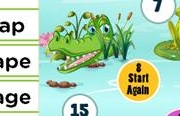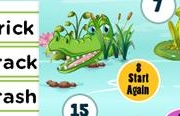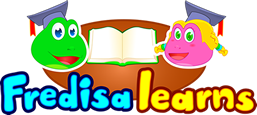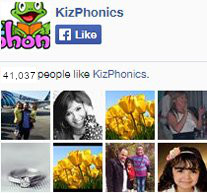Short ‘E’ Word Families Game : ell, end, ent, est
Learning Objectives: Built around words with the short vowel ‘e’, these phonics games will help children review and practice many three-letter word families or word patterns. Word families are a group of words that have a similar sound and writing pattern. They often rhyme and are perfect for teaching together.
Words with the following common word patterns will be reviewed in this game:
Most of these word families are formed using a combination of the short ‘e’ with ending digraphs and blends. A good mastery of word patterns makes it easy for children to read and spell unfamiliar words. It is a great early literacy skill to have. The game involves a lot of listening and spelling. Children are expected to listen carefully to avoid being tricked. Start by choosing from the three game designs. The goal of this phonics game is to navigate a treacherous terrain filled with pirates, crocodiles and space monsters. It is all about luck! Choose to play with a friend in team mode of by yourself in single mode. You will need luck to avoid being eaten by a monster and have your game restarted.
Leveraging Phonics Games for Mastery of Words Ending with 'Ent,' 'Est,' and 'Ell'
Unlocking the skill of reading is akin to handing over the keys to a limitless world of imagination, knowledge, and understanding. Phonics plays an indispensable role in this journey. By focusing on word families like words that end in ""ent,"" "est," and "ell," parents and educators can make the learning process both effective and entertaining. This article dives into how you can leverage phonics games to master these particular word endings.
The Pillar of Phonics in Reading
Phonics is a fundamental part of learning to read, where kids learn the sounds corresponding to letters and letter combinations. This helps in decoding words and contributes to a clearer understanding of language. It's essential for young learners to grasp phonics concepts to become proficient readers.
What Are Word Families?
Word families are groups of words sharing common sequences of letters or sounds, like words that end in "ent" such as "bent" and "went," or words ending with "ell" like "bell" and "well." Teaching children to recognize these patterns can significantly speed up their reading and comprehension skills. Check out the Short E Word Families Game for an interactive learning experience featuring these word families.
Words with 'Ent' at the End: The Teaching Opportunity
Words that end in "ent" often happen to be nouns or adjectives and sometimes even verbs. For instance, "tent," "dent," and "went" all belong to this category. Learning words that end with "ent" allows children to form more complex sentences, enhancing both their written and spoken language skills.
The Power of Words Ending with 'Est'
Another important word family focuses on words that end in "est." Examples include "best," "rest," and "west." These words often describe the superlative form of an adjective and are a vital part of everyday vocabulary. Just like words ending with "ent," the "-est" word family can be seamlessly integrated into games to enrich the learning process.
Exploring Words Ending with 'Ell'
Words that end with "ell" provide a different dimension for young readers. These include words like "sell," "tell," and "yell," most of which are verbs. Integrating words ending with "ell" into a child's vocabulary can help them in forming descriptive and action-oriented sentences.
The Joy of Learning through Games
Children are naturally attracted to games. They love the engagement and the competition, even if it's with themselves. Games can turn the often arduous process of learning to read into a fun activity. One such comprehensive game that provides a multi-faceted approach to phonics is Kindergarten Crocodile Phonics Game.
Tips for a Fulfilling Learning Experience
Select games that focus specifically on the word families your child is learning, like those that feature words ending with "ent," "est," or "ell."
Balance the gameplay time with revision sessions to help consolidate what they've learned.
Keep track of your child's progress and offer consistent praise and rewards to keep the motivation high.
By turning the learning process into a playful experience and focusing on specific word families, you make reading a far less daunting task for children. Engaging games can help cement their understanding of words that end in "ent," "est," and "ell," setting them up for a lifetime of successful reading.











